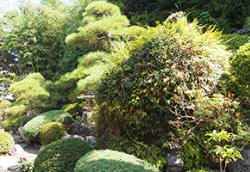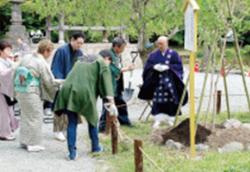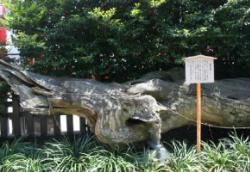- Yokohama-shi Top Page
- Kanazawa Ward Top Page
- Introduction of the ward
- History of Kanazawa Ward
- Yokohama Kanazawa, where history lives
- Kanazawa unraveled from assets
- Yotsuishi, Nanai, and Yanagi in Kanazawa
Here's the text.
Yotsuishi, Nanai, and Yanagi in Kanazawa
Last Updated April 1, 2022
Yotsuishi in Kanazawa
It is also called Kanazawa Four Stones. It is thought to be a tradition born from the tradition of ancient religion, which was believed to have the spirits in Itsukushi.

Kinryuin Tobiishi
| The name of the stone | Overview |
|---|---|
| Beautiful Onnaishi Ubaishi | In the Kamakura era, when Sadaaki Hojo developed the garden of Shomei-ji Temple, it is thought that it was placed at Shomei-ji Ajigaike, and only Mi Onnaishi (some say Ubaishi) remains in Shomei-ji Ajigaike. I am. |
| Fukuishi | It is located on the approach to Biwajima Shrine. It is said that when Yoritomo prayed to Mishima Myojin, who moved to Seto Shrine and worshiped, he took off his clothes on this stone. |
| Flying stone | It's located in the backyard of Kinryu-in Temple. There is a legend that Mishima Myojin jumps on this stone from Izu Mishima, which is the origin of Seto Shrine. City Registered Cultural Properties |
Nanai Kanazawa
In Kanazawa, wells have been valued for a long time because of the inconvenience of drinking water at the seaside surrounded by mountains.
In the early Showa era, Kanazawacho and Rokuuraso Village merged with Yokohama City increased the momentum that many residents were suffering from drinking water and miscellaneous water such as washing, so they wanted to benefit from the Yokohama Water Supply. It comes from the wish of the residents.
When the water was transferred to Yokohama City and the water supply was supplied, "Kanazawa Nanai" disappeared without being neglected.
| Name of the well | Overview |
|---|---|
| Well | Kadoi-do was on the right, about 100m east of Shomeiji Akamon. |
| Kamei | It is a stone Maruido behind a private house on the west side of Shomeiji Akamon. |
| Somei | It is a stone Maruido located on the west side of the track near Yokohama from Kanazawa Bunko Station. |
| Shiroi | Kamariya Road Shirai was under the cliff on the right side of the bridge. |
| Akai | It is located behind the house of Shohoin. In the past, it is said that this name was given because red water came out. |
| Nakai | Maruido is located in the garden of a private house (the precincts of Motoshinjoji) in the middle of Kamariya Minakai Street. |
| Arai | It was located at the site of the mansion of Arai Myoho in front of Kinryu Zenin. |
Kanazawa Eight Trees
During the Kamakura period, famous trees were gathered at Seto Shrine and Shomeiji Temple, which flourished and attracted many people.
Like Kanazawa Hakkei, it was written in "Famous Waka Monogatari" in 1614 (1614), and has been known for a long time. Now they are all dead.

Tree planting of Aoba maple at Shomeiji Temple

Sedo Shrine's Snake Mixed Kashiwa
| Type of wood | Overview |
|---|---|
| Aoba maple | It was reported as a maple that did not turn red even in winter on the banks of the name Teramoto Domae Ajigaike. Noh "Mutsura" related to Kanazawa is derived from this maple. After being withered and lost, it had not been on the grounds for a long time, but was planted on the day of the 12th Shomeiji Firewood Noh. |
| Saiko plum | It is said that Sanetoki Hojo ordered it from Saiko, Hangzhou, China. In the past, there was Furuki at Shomei-ji Temple. It was planted in Mudgame Park as a project commemorating the 60th anniversary of the constituency system. |
| Black plum Cherry plum | In "Famous Waka Monogatari", "It is located at Ryogi Shomyoji Temple. However, it is not clear what tree it is. Cherry plums are planted in Mudgame Park as a project commemorating the 60th anniversary of the constituency system. |
| Wenju Cherry Blossom The cherry blossoms of Fugen Elephant | It is said to be a kind of double-flowered cherry tree in Shomei-ji Temple. Wenju cherry blossoms were on the left of Kondo in front of the floor, like the cherry blossoms on the left, and the cherry blossoms of Fugen elephant were on the left of Kondo in front of the floor, similar to the right-handed Tachibana. |
| Snake-mixed Kashiwa | Kashiwa Maki, which was located on the precincts of Seto Shrine, died in a large wind in 1680 (1680). Even now, the thick trunk lays on the grounds. |
| 8th famous tree One pine | It was located in the scenic spot "Shrigaura" near Oppama of the room tree. It was also called Kazuha pine. |
| 8th famous tree Sanbonsugi | Located south of Seto Shrine, Snake-mixed Kashiwa, this Sanbonsugi was the stage of Noh "Hojo Monk" related to Kanazawa. |
※Saiko plum and Sakura plum, which were restored during the 60th anniversary project of the constituency system, were transplanted by rebuilding the ward government building and returned to the new mud turtle park.
※The 8th famous tree has various theories.
Inquiries to this page
Kanazawa Ward General Affairs Department Regional Promotion Division
Telephone: 045-788-7804
Telephone: 045-788-7804
Fax: 045-788-1937
Email address: kz-chishin@city.yokohama.jp
Page ID: 433-419-621













